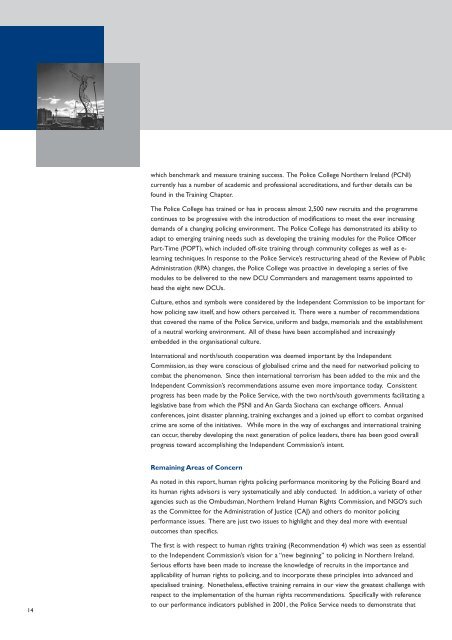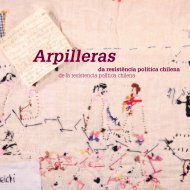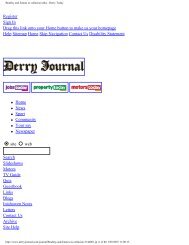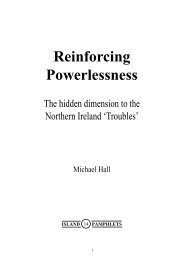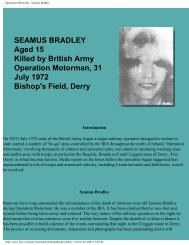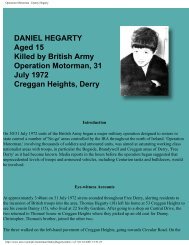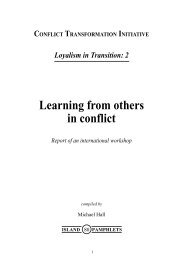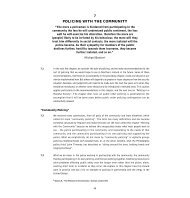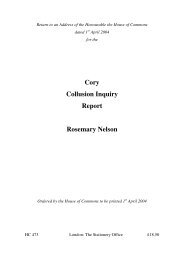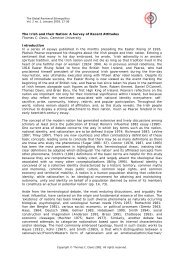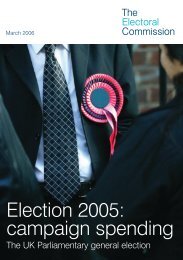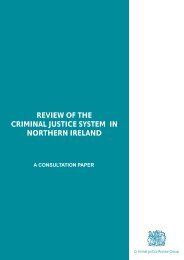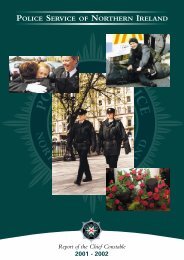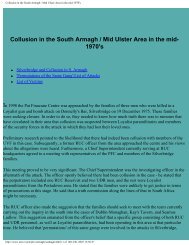11293 report 19 - CAIN - University of Ulster
11293 report 19 - CAIN - University of Ulster
11293 report 19 - CAIN - University of Ulster
You also want an ePaper? Increase the reach of your titles
YUMPU automatically turns print PDFs into web optimized ePapers that Google loves.
which benchmark and measure training success. The Police College Northern Ireland (PCNI)currently has a number <strong>of</strong> academic and pr<strong>of</strong>essional accreditations, and further details can befound in the Training Chapter.The Police College has trained or has in process almost 2,500 new recruits and the programmecontinues to be progressive with the introduction <strong>of</strong> modifications to meet the ever increasingdemands <strong>of</strong> a changing policing environment. The Police College has demonstrated its ability toadapt to emerging training needs such as developing the training modules for the Police OfficerPart-Time (POPT), which included <strong>of</strong>f-site training through community colleges as well as e-learning techniques. In response to the Police Service’s restructuring ahead <strong>of</strong> the Review <strong>of</strong> PublicAdministration (RPA) changes, the Police College was proactive in developing a series <strong>of</strong> fivemodules to be delivered to the new DCU Commanders and management teams appointed tohead the eight new DCUs.Culture, ethos and symbols were considered by the Independent Commission to be important forhow policing saw itself, and how others perceived it. There were a number <strong>of</strong> recommendationsthat covered the name <strong>of</strong> the Police Service, uniform and badge, memorials and the establishment<strong>of</strong> a neutral working environment. All <strong>of</strong> these have been accomplished and increasinglyembedded in the organisational culture.International and north/south cooperation was deemed important by the IndependentCommission, as they were conscious <strong>of</strong> globalised crime and the need for networked policing tocombat the phenomenon. Since then international terrorism has been added to the mix and theIndependent Commission’s recommendations assume even more importance today. Consistentprogress has been made by the Police Service, with the two north/south governments facilitating alegislative base from which the PSNI and An Garda Siochana can exchange <strong>of</strong>ficers. Annualconferences, joint disaster planning, training exchanges and a joined up effort to combat organisedcrime are some <strong>of</strong> the initiatives. While more in the way <strong>of</strong> exchanges and international trainingcan occur, thereby developing the next generation <strong>of</strong> police leaders, there has been good overallprogress toward accomplishing the Independent Commission’s intent.Remaining Areas <strong>of</strong> ConcernAs noted in this <strong>report</strong>, human rights policing performance monitoring by the Policing Board andits human rights advisors is very systematically and ably conducted. In addition, a variety <strong>of</strong> otheragencies such as the Ombudsman, Northern Ireland Human Rights Commission, and NGO’s suchas the Committee for the Administration <strong>of</strong> Justice (CAJ) and others do monitor policingperformance issues. There are just two issues to highlight and they deal more with eventualoutcomes than specifics.14The first is with respect to human rights training (Recommendation 4) which was seen as essentialto the Independent Commission’s vision for a “new beginning” to policing in Northern Ireland.Serious efforts have been made to increase the knowledge <strong>of</strong> recruits in the importance andapplicability <strong>of</strong> human rights to policing, and to incorporate these principles into advanced andspecialised training. Nonetheless, effective training remains in our view the greatest challenge withrespect to the implementation <strong>of</strong> the human rights recommendations. Specifically with referenceto our performance indicators published in 2001, the Police Service needs to demonstrate that


